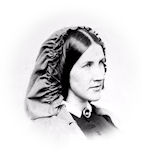 Georgeanna to Mother.
Georgeanna to Mother.
Steamer Knickerbocker.
If my letter smells of “Yellow B.” sugar, it has a right to, as my paper is the cover of the sugar-box. Since I last wrote I have been jumping round from boat to boat, and Saturday came on board the Knickerbocker at Mr. Olmsted’s request, with Mrs. Strong and some others, to put things in order, and, privately, to be on hand to “hold” the boat, which had been made over to the Commission, over the heads of the New Jersey delegation. Dr. Asch was on board, and we had the New Jersey dinner table abolished and 56 Sanitary Commission beds made on the dining-room floor that night. The 200 wounded and sick brought down to Fortress Monroe under our care were transferred to the shore hospital, where we stole some roses for our patients on the Small. Saw regiments embarking for Norfolk, which surrendered the next day. Saw Mr. Lincoln driving past to take possession of Norfolk; and by Tuesday had the boat all in order again, with the single exception of a special-diet cooking-stove. So we went ashore at Gloster Point and ransacked all the abandoned rebel huts to find one, coming down finally upon the sutler of the “Enfants Perdus,” who was cooking something nice for the officers’ mess over a stove with four places for pots. This was too much to stand; so under a written authority given to “Dr. Olmsted” by the quartermaster of this department, we proceeded to rake out the sutler’s fire and lift off his pots, and he offered us his cart and mule to drag the stove to the boat and would take no pay! So through the wretched town filled with the debris of huts and camp furniture, old blankets, dirty cast-off clothing, smashed gun-carriages, exploded guns, vermin and filth everywhere, and along the sandy shore covered with cannon-balls, we followed the mule,—a triumphant procession, waving our broken bits of stovepipe and iron pot-covers. I left a polite message for the Colonel “Perdu,” which had to stand him in place of his lost dinner. I shall never understand what was the matter with that sutler, whose self-sacrifice was to secure some three hundred men their meals promptly.
We set up our stove in the Knickerbocker, unpacked tins and clothing, filled a linen-closet in each ward, made up beds for three hundred, set the kitchen in order, and arranged a black hole with a lock to it, where oranges, brandy and wine are stored box upon box; and got back to Yorktown to find everybody at work fitting up the “Spaulding.” I have a daily struggle with the darkeys in the kitchen, who protest against everything. About twenty men are fed from one pail of soup, and five from a loaf of bread, unless they are almost well, and then no amount of food is enough.
One gets toughened on one’s fourth hospital ship and now I could stop at nothing; but it is amusing to see the different ways taken to discover the same thing. Dr. McC.: “Well-my-dear-fellow-is-anything-the-matter-with-your-bowels-do-your-ears-ring-what-’s-your-name?” Dr. A.: “Turn over my friend, have you got the diaree?” Dr. A. was in a state of indignation with Miss Dix in the shore hospital at Yorktown. She has peculiar views on diet, not approving of meat, and treating all to arrowroot and farina, and by no means allowing crackers with gruel. “Them does not go with this,” as Dr. A. gracefully puts the words into Miss Dix’s mouth.


